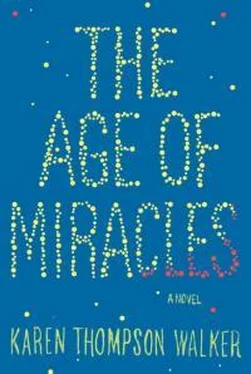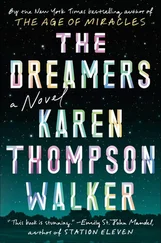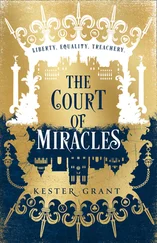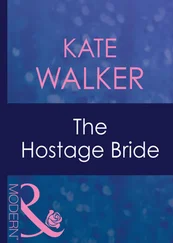“Something’s wrong,” he said.
His dark eyes, squinting, searched the open sky.
We waited a few more long minutes, but the sky remained a perfect blue, ominously empty of aircraft and contrails.
It was as if we knew even then what had happened.
We learned from Seth’s television the details of the Orion ’s final fate. It disintegrated two hundred miles off the coast of California, cause unknown. All six astronauts on board were killed.
Seth and I sat stiffly on opposite sides of his couch, watching the stream of news reports flow into his living room.
Already, the networks were flashing photos of the astronauts from the day they’d left the earth ten months earlier, their faces fresh and happy, their white suits so crisp and bright in the sunshine, their gigantic helmets gleaming beneath their arms as they waved—so different from the way they looked in the recent video transmissions, after they’d grown so thin and frail in space that it seemed almost natural the way they floated, weightless, while they spoke to Houston via satellite link.
We said nothing for a while. I shifted in my seat. The couch squeaked beneath me. There were holes in the leather.
Seth was the first to speak.
“Would you rather die in an explosion?” he asked. “Or of a disease?”
I let the question hang. His mother had died here. I didn’t want to say the wrong words.
“The thing about an explosion,” he said, “is that it only takes a second.”
After that, Seth and I were often together.
Ours was a sudden bond, the kind possible only for the young or the imperiled. Time moved differently for us that spring: A string of long afternoons was as good as a year.
We quit spending lunches in the library and stretched out instead beneath a pair of dead pine trees at the far edge of the quad, where we watched the clouds drift across the sky. Seth started saving me a seat on the bus every morning and every afternoon.
At first I was aware of the other kids watching us. I sensed their chatter. But soon I ceased to notice. I stopped caring what they thought.
“He seems like a nice boy,” said my mother. “Let’s have him over for dinner.”
But I only wanted to be alone with Seth. I didn’t want anyone else around.
• • *
I was with Seth on the day we passed the wheat point. Now it was official: Wheat could no longer grow on this planet without the aid of artificial light. We watched from a hillside as people pushed grocery carts across the supermarket parking lot, heaped full of canned food. Panic had returned. You could feel it in the air, an ending, a tingling, like a taste in the back of your throat.
“Would you rather starve?” said Seth. “Or die of thirst?”
This had become a game of ours. We were serious kids made more so by the times.
“Starve,” I said. “You?”
“Thirst,” he said. He kicked a rock down the slope. Dust sputtered behind it. The rock disappeared into a tangle of desiccated ice plant. Seth always chose the quickest death.
Seth was at my house when my mother’s greenhouse was delivered. We watched the workers assemble it out back. The glass glittered as they mounted the sunlamps and poured the soil. We watched them unfurl an orange electrical cord and then insert the fat plug into an outdoor socket. We were one of the last families on our street to buy one. My mother had ordered it without consulting my father, and while she lowered a series of small plants into the soil, my father watched from the dining room table, his arms crossed. Then he went upstairs. By the end of the day, we had two rows of green beans and three rows of strawberries growing in the greenhouse.
“Strawberries are a waste,” said my father. “If we’re going to be growing anything, we should be growing mushrooms. They don’t depend so much on light.”
A rash of white-night crimes also struck our city. The real-timers were blamed. Who else would be out at those late hours? The windows of Sylvia’s car were smashed in her driveway. Her garage was soon spray-painted with thick, drippy words: Get the fuck out .
I wondered how my father felt about that, but I didn’t ask, and he didn’t say.
It seemed to me that time moved at high speed that spring. Seth’s hair grew long again and began to fall into his eyes. I grew out my bangs, and Seth said he liked them. I started shaving my legs, and I bought a real bra—one that fit this time. One dark afternoon Seth taught me to ride his skateboard, and I still remember the way his hand felt on my back as he jogged beside me in the glow of the streetlights, me wobbling over the cracks in the sidewalk, content.
After school, we’d go searching in the canyons for the skeletons of birds—they were everywhere, a profusion of bone and feather, as abundant as seashells. We hunted for the last living eucalyptus, which we found, we were certain, withering on the edge of a sandstone bluff by the ocean. We collected the neighborhood’s last blades of grass. We kept the final flowerings of daisies, of marigolds, of honeysuckle. We pressed petals between the pages of dictionaries. We lined our shelves with relics from our time. Look here , we pictured saying someday, this one we called maple, this one magnolia, this aspen, this oak . On dark days, Seth drew maps of the constellations as if those bodies, too, might soon fall away.
Seth’s father was frequently at his lab. He left home early. He came home late. He was the coffee cup in the kitchen sink, the cigarettes in the ashtray out back, the lab coat slung over the banister. He was a name on the envelopes that piled, unopened, in a huge stack by the door, a voice on the phone instructing Seth to order pizza, eat without him. My parents never knew how little Seth’s father was at home when I was there.
We were home alone at Seth’s house on the day the power went out.
The television snapped off, the lights, too. I grabbed Seth’s hand in the dark. It was four o’clock in the afternoon. A quiet flooded the house, as if silence were a condition of the dark. We had sixteen hours, maybe more, until the sun would rise again. We fumbled together to the front door, swung it open: It was dark out there, too, a prehistoric dark, the soundless glittering of stars.
My mother called my cell phone from work. “Stay put,” she said. “Just stay put. Lock the doors, and don’t let anyone in.” We scoured the house for flashlights. We bumped each other in our blindness and ran into the walls. We broke a lamp and laughed for a long time. Seth lit candles with one of his father’s lighters. We carried them around like torches, our faces shadowy in the flame light. We wondered if it might last forever, the age after electricity.
Finally, we sat down on the hardwood floor of the living room, our candles flickering around us. Seth produced a deck of cards.
“Watch this,” he said.
He began to build a tower, three cards at a time.
The house was so silent in the dark that I could hear the sound of the cards brushing one another as he worked. He looked older in candlelight. I watched him for a long time.
“Try it,” he said. He held out a pair of cards. His eyes were shining in the candlelight.
But my hand turned shaky. I worried I’d knock the whole thing down.
“That’s okay,” he said. “The second level is a lot harder than the first.”
I’d been wanting for weeks to tell Seth about my father and Sylvia—and it felt possible, in that low light, to say the words out loud.
I took a breath and swallowed hard.
“I’m going to tell you a secret,” I said.
Seth stopped what he was doing and looked at me.
“I’ve seen my dad at Sylvia’s house.”
Читать дальше












